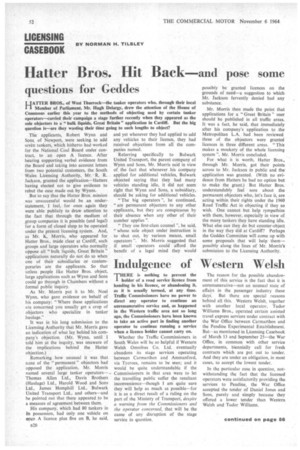Hatter Bros. Hit
Page 54

If you've noticed an error in this article please click here to report it so we can fix it.
Back and pose some
questions for Geddes
HATTER BROS., of West Thurrock—the tanker operators who, through their local Member of Parliament, Mr. Hugh Delargy, drew the attention of the House of Commons earlier this year to the methods of objecting used by certain tanker operators—carried their campaign a stage further recently when they appeared as the sole objectors to a bulk liquids, Great Britain" application in Cardiff. But the big question is—are they wasting their time going to such lengths to object?
The applicants, Robert Wynn and Sons, of Newport, were seeking to add seven tankers, which hitherto had worked for the National Coal Board under contract, to an open A licence. After hearing supporting verbal evidence from the Board and taking into account letters from two potential customers, the South Wales Licensing Authority, Mr. R. R. Jackson, granted the application—Hatters having elected not to give evidence to rebut the case made out by Wynns.
But to say that the Hatter Bros. mission was unsuccessful would be an understatement, I feel, for once again they were able publicly to draw attention to the fact that through the medium of group companies it is possible (and legal) for a form of closed shop to be operated under the present licensing system. And,. as Mr. K. Morris, who appeared for Hatter Bros., made clear at Cardiff, such groups and large operators who normally oppose all "bulk liquids, Great Britain" applications naturally do not do so when one of their subsidiaries or contemporaries are the applicants. So that unless people like Hatter Bros. object, large applications such as Wynn and Sons could go through in Chambers without a formal public inquiry.
As Mr. Morris put it to Mr. Noel Wynn, who gave evidence on behalf of his company; "Where these applications are concerned you usually get a crop of objectors who specialize in tanker haulage," It was in his long submission to the Licensing Authority that Mr. Morris gave an indication of what lay behind his company's objection. (Mr. Wynn, until I told him at the inquiry, was unaware of the implications behind the Hatter objection.) Remarking how unusual it was that none of the " permanent " objectors had opposed the application, Mr. Morris named several large tanker operators— Thomas Allen Ltd., Davis Brothers (Haulage) Ltd., Harold Wood and Sons Ltd„ James Hemphill Ltd„ Bulwark United Transport Ltd., and others—and he pointed out that there appeared to he a measure of agreement between them.
His company, which had 80 tankers in its possession, had only one vehicle on open A licence plus five on B, he said, and yet whenever they had applied to add any vehicles to their licence, they had received objections from all the companies named.
Referring specifically to Bulwark United Transport, the parent company of Wynn and Sons, Mr. Morris said in view of the fact that whenever his con-finny applied for additional vehicles, Bulwark objected saying that they had many vehicles standing idle, it did not seem right that Wynn and Sons, a subsidiary, should be asking for additional vehicles.
"The big operators ", he continued, " are permanent objectors to any other applicants, but they are conspicuous by their absence when any other of their number applies ".
" They use first-class counsel", he said, "whose sole object under instruction is to shut out, by various means, small operators ". Mr. Morris suggested that if small operators could afford the benefit of a legal mind they would possibly be granted licences on the grounds of need—a suggestion to which Mr. Jackson fervently denied had any substance.
Mr. Morris then made the point that applications for a "Great Britain" user should be published in all traffic areas. It was a fact, he said, that immediately after his company's application to the Metropolitan L.A. had been reviewed three of the objectors were granted licences in three different areas. "This makes a mockery of the whole licensing system ", Mr. Morris concluded.
For what it is worth, Hatter Bros., through Mr. Morris, got their points across to Mr. Jackson in public and the application was granted, (With no evidence from Hatters he had no option but to make the grant.) But Hatter Bros. understandably feel sore about the permanent objectors who, let's face it, are acting within their rights under the 1960 Road Traffic Act in objecting if they so wish. One cannot but help sympathize with them, however, especially in view of the many tankers they have standing idle. What else can they do but counter-object in the way they did at Cardiff? Perhaps the Geddes Committee will come up with some proposals that will help them— possibly along the lines of Mr. Morris's submission to the Licensing Authority.












































































































































































